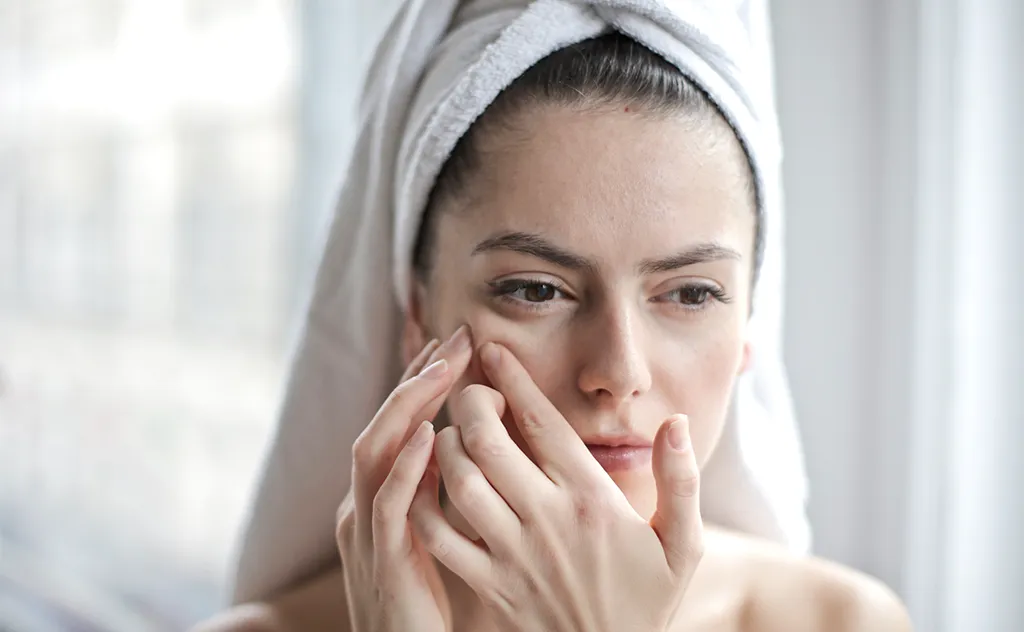In winter, or in special situations, do you find that you have drier skin than usual and do nothing but scratch? Do you feel uncomfortable when you are around others? Would you like your skin to stay the same all year round?
Dry and itchy skin is a common problem that afflicts many people at certain times of the year, generating discomfort and compromising daily well-being.
This condition can be caused by a number of factors including excessive exposure to extreme temperatures, insufficient humidity, the use of harsh cleansers or simply a genetic predisposition.
Dry epidermis can lead to an uncomfortable feeling of tightness and itching, creating a vicious circle that can become chronic if not properly addressed.
Are you familiar with this feeling? Fortunately, there are several remedies and strategies to alleviate dry and itchy skin, allowing you to re-establish a healthy skin balance.
From deep moisturising with specific creams to adopting a proper skin care routine, in this article we will explore together the underlying reasons for this condition and see practical tips to prevent and manage it effectively.
By understanding the underlying causes and adopting targeted solutions, you can restore your skin’s vitality and give it a healthy and comfortable appearance all year round.
Have you ever heard of skin xerosis?
Cutaneous xerosis is a medical term used to describe the condition of dry, flaky skin. This condition occurs when the skin loses its normal moisture and becomes dehydrated, often resulting in a rough, cracked or itchy skin surface.
The skin is composed of several layers, including the stratum corneum, which is the most superficial layer. The stratum corneum is composed of dead cells that are continuously renewed. When the stratum corneum is properly moisturised, the dead cells fall off easily, leaving the skin smooth and soft.
In skin xerosis, the stratum corneum is dehydrated and the dead cells stick together, forming scales.
So what is cutaneous xerosis? It is a skin disorder characterised by excessive dryness of the skin. It is a very common condition that can affect people of all ages, but is more common in the elderly.
Skin xerosis can affect different parts of the body, but it is easier to see in areas such as the hands, feet, legs and elbows. You may even suffer from dry, itchy skin on your back.
What can cause itchy skin?
The itching associated with skin xerosis can be caused by several factors. First, the loss of the skin’s natural moisture content leads to a decrease in its protective barrier, making it more susceptible to external irritation. Dry air, extreme temperatures and harsh detergents can then irritate the skin, causing itching. So can certain medications, medical conditions or, more simply, ageing.
In addition, skin xerosis can be linked to a deficiency of certain vitamins and nutrients that are essential for healthy skin.
So what vitamin is missing when suffering from dry skin? In particular, a lack of vitamin E can contribute to this particular disorder. Vitamin E is a powerful antioxidant that helps protect skin cells from damage caused by free radicals. A diet deficient in this vitamin may impair the skin’s ability to retain moisture and maintain its elasticity.
Actually, there are also other vitamins that play a key role in skin health. Vitamin A, for instance, is involved in the production of sebum, the oil that helps keep the skin hydrated, while vitamin D plays a role in cellular activities.

Symptoms of dry itchy skin
Dry itchy skin can manifest itself with a range of symptoms that can vary in intensity.
Here are some of the most common:
- Itching: this is the predominant symptom and can vary from mild to very intense; it is often the result of dehydration of the skin and its inability to adequately retain moisture;
- Redness: areas characterised by dry and itchy skin can easily become red;
- Flaking or scaling: dry skin tends to flake or form small scales that may increase the need to scratch;
- Feeling of tightness: dry skin lacks elasticity and this can cause tightness, especially after washing or in low humidity environments;
- Small cracks or fissures: In more severe cases, dry skin may develop small cracks or fissures, especially in areas subject to frequent movement, such as hands and feet;
- Skin irritations: finally, dry skin is more susceptible to irritation, which can be caused by external factors such as aggressive detergents or scratching due to itching.
So, scratching is not an option when you suffer from dry and itchy skin. Doing so would only risk worsening the situation and causing inflammation.
So what to do? Let’s see together how best to deal with dry and itchy skin.
How to get rid of itchy skin?
The goal if you suffer from dry skin is to restore skin hydration and relieve irritation. And there are many ways to do this.
Some help you treat itchiness that is already present while other tips are best practices to prevent it from arising again.
Use moisturising creams
The use of moisturising creams, also recommended among the natural remedies for dermatitis, is an essential step in the treatment of dry skin. Indeed, these products perform several functions that help to soothe and prevent itching:
- They restore moisture: they contain ingredients such as glycerine, hyaluronic acid, urea and natural oils that help restore and retain moisture in the skin, thus reducing dryness;
- They strengthen the skin barrier: many moisturisers contain ingredients that help strengthen the skin barrier, helping to prevent water loss and protect the skin from irritating external factors;
- They calm irritation: soothing and anti-inflammatory ingredients in some moisturisers, such as aloe vera, CBD or chamomile, can help calm irritation and reduce itching;
- They make the skin softer: regular moisturising improves the elasticity of the skin, reducing the feeling of tightness and discomfort.
For maximum benefits, apply moisturiser to the skin just after washing, when the skin is still slightly damp. This helps to trap the moisture that has just been absorbed by the skin.
Avoid too hot or frequent bathing
Hot water can remove the natural oils on the surface of the skin, thus contributing to its dryness and making it more susceptible to itching.
Here are some tips for proper personal hygiene, especially if you suffer from dry, itchy skin all over your body:
- Moderate temperatures: opt for showers or baths at intermediate temperatures; lukewarm water is less aggressive on the skin than hot water;
- Limit duration: prolonged baths can contribute to increased moisture loss;
- Gentle cleansers: use cleansers designed for dry skin and without perfume to avoid additional irritation;
- Gentle drying: after a bath or shower, gently pat the skin instead of rubbing vigorously;
- Avoid cosmetics on certain areas: if you suffer from dry, itchy skin on your face, consider using cleansers only when necessary and limit the use of cosmetics;
- Instant moisturisation: immediately apply a moisturising cream to your skin after bathing or showering to help seal in moisture.
These are good habits that allow you both to treat a disorder already in progress and to avoid its onset.
Wear clothes made of natural fibres
Natural fibres, such as cotton and linen, offer several advantages for the skin:
- Breathability: they allow the skin to breathe, preventing the retention of moisture that could cause irritation;
- Moisture absorption: cotton, in particular, has the ability to absorb and retain moisture, keeping the skin drier and reducing the sensation of dampness that could cause itching;
- Less friction: natural fibres are generally softer on the skin than synthetic materials, thus reducing the risk of irritation and itching caused by excessive friction;
- Allergen avoidance: natural fibres are less likely to cause allergic reactions than synthetic fabrics due to their components.
In general, if you suffer from dry, itchy skin on your arms or legs, favour loose, soft clothing. Also, wash clothes with mild detergents, avoiding fabric softeners or harsh chemicals that may remain on the skin.
Drink enough water
It is among the best natural remedies for dry and itchy skin. Water plays an essential role in maintaining the body’s water balance, including the skin.
Let’s see how internal hydration can affect dry skin:
- Improves hydration: drinking enough water helps maintain internal hydration, which can reflect positively on the skin, reducing dryness and itching;
- Supports the skin’s barrier function: which is essential to prevent excessive moisture loss;
- Promotes blood circulation: good blood circulation helps transport nutrients and moisture to skin cells, promoting a healthy appearance;
- Helps eliminate toxins: indirectly contributes to the overall health of the skin.
To keep your skin hydrated, you should drink at least eight glasses of water a day. However, needs may vary depending on body weight, age, level of physical activity and other individual factors. To increase your water intake, you can opt for a balanced diet rich in fruit and vegetables, which are also hydrating.
Apply cold compresses
The benefits of cold compresses are by no means to be underestimated:
- Immediate relief: can provide instant relief from itching, reducing the feeling of irritation on the skin;
- Reduce inflammation: cold can help calm inflammation and any redness or swelling associated with itching;
- Counteract the sensation of heat: in situations where the skin is reddened or you feel a sensation of heat, cold compresses can help cool the affected area.
You can use instant ice or, more simply, a home-made remedy by wrapping ice cubes or a bag of frozen vegetables inside a thin cloth. Then gently apply it to the itchy area for a few minutes, taking care not to directly touch the skin with the ice.
When does it become necessary to seek medical attention?
You should consult a doctor if dry skin and itching persist or worsen despite taking preventive measures and treatment.
Talk to a specialist in the following cases:
- Persistence of symptoms: if dry skin and itching last for a prolonged period without improvement;
- Severe symptoms or skin irritation: if dry skin is accompanied by extensive redness, swelling, blisters or if cracks or deep lesions develop;
- Persistent nocturnal itching: itching that occurs mainly at night could be indicative of more complex dermatological conditions, such as eczema or psoriasis;
- Sudden changes in the skin: if you notice new spots, pigmentation changes or excoriations that do not heal;
- Dry skin associated with other symptoms: if it is accompanied by systemic symptoms, such as fatigue and unexplained weight loss, it could be indicative of underlying medical conditions of another nature;
- Pre-existing conditions: if you suffer from pre-existing skin conditions, such as dermatitis or psoriasis.
A dermatologist will be able to carefully examine your skin, assess your medical history and formulate a customised treatment plan to address the underlying cause of your symptoms. The correct diagnosis is the basis for effective management of dry, itchy skin.
 Contact us
Contact us 


